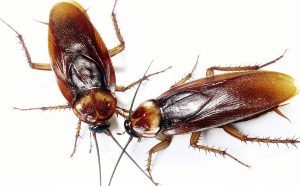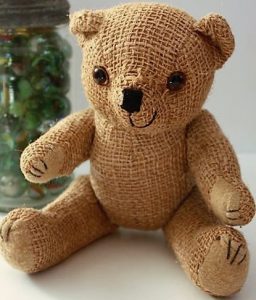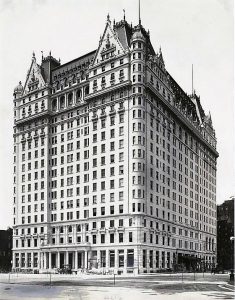
Shenanigans at the Plaza
Previously in the novel: Leon, a novice mercenary, is foiled in kidnapping the Archbishop of Canterbury by a mysterious man in black. The man in black turns out to be David, better known as Edward the Prince of Wales. Soon to join the world of espionage is Wallis Spencer, an up-and-coming Baltimore socialite. David kills an ambassador in Shanghai.
David was miffed. He was not in London long enough to have an intimate evening with Lady Elvira Chatsworth or even Freda Ward before Tommy Lascelles informed him that the Foreign Ministry had recommended to the King that it would be a good idea to send the Prince of Wales to New York City to participate in the U.S. celebration of Labor Day.
“Labor Day?” David raised an eyebrow. “What? No Tory Day?”
“It’s not that kind of labor. It’s to acknowledge the American working class.”
“Tommy, I was making a joke.”
“I know. I was ignoring it.”
On his first evening out from Portsmouth, David found the selection of ladies rather depressingly sparse at dinner, so he took a walk along the deck which was shrouded in a particularly dense fog. As he was about to flick his cigarette overboard an old woman, who was dressed more as a street peddler than as an ocean liner passenger, walked up in a fit of giggles.
“Pardon, yer majersty,” she gurgled in a hardly understandable Cockney, “but could I please have yer butt? As a souvenir of meeting your worshipful holiness.”
“Excuse me. What did you say?”
The current group of strollers harrumphed and hurried away. David leaned in to the old woman and cupped his ear.
“I’m sorry. I didn’t quite catch your comment. Will you please repeat?”
“Yer butt,” she said loudly, which caused the next couple to rush along. “You know, yer fag butt.”
David’s brow over his sagging eye arched. “I must say, my dear lady—“
“Oh, get over yerself, David,” she rasped. “Steam room. Seven in the morning.” The old woman grabbed the burnt-out cigarette and tossed it into the ocean before she fumed into the fog.
The next morning David awoke early, went for a light run around the deck and entered the steam room. Wrapping a towel around his middle, he sat, waiting alone for details for his next mission from MI6. Exactly at seven, a pudgy old man entered from the locker room and sat next to him.
“Begging your pardon, David,” he whispered in a familiar Cockney. “Me old lady can be rough around the edges. You know we’ve been doing this since the old queen died.”
“Think nothing of it. Now what is this important business in New York?” He wiped sweat from his brow.
“They want you to steal an American socialite’s jewelry and then mail them back to her a month later. No return address, of course.”
David sat up. “What? That’s the most preposterous thing I’ve ever heard.”
“Don’t jump down my throat.” The old man looked away and sniffed. “I don’t make this stuff up. I just pass messages along.”
Leaning back, David smiled. “You’re much too sensitive for this line of work, you know.”
“Come close to getting killed too, you know. Me old lady pulled me chestnuts out of the fire, many a time.”
“Very well. What else?”
“You heard of Woolworth’s Five and Dime? It’s his daughter. Jessie Donohue. They’re one of the richest families in America, but because their money comes from selling cheap stuff to poor people, other rich folks give them the cold shoulder. That’s why she buys so much jewelry. It’s worth $600,000.”
David was already becoming bored, but he dared not make any more brash remarks before the old man was finished.
“The problem is her husband. He spends all his time gambling and romancing both men and women around the world. Scuttlebutt has it the husband had contracted the organization to steal his wife’s jewels to pay off a blackmailer who knows he’s just broken off an affair with a black male dancer. And I know you’re thinking what does this have to do with the national security of the British Empire. Your own brother George is a well-known philanderer visiting both sides of the street.”
“Well,” David interjected in a sardonic tone, “he is considered to be the handsome brother in the family.”
“If darker forces realize they can hire the organization—the biggest, most successful crime syndicate in the history of civilization—to blackmail a rich American family, what is to stop them from extorting the royal Windsors?”
“I thought I had been so outrageous that anything the rest of the family did would be too dreary for the public to notice.”
“Mixing the races and not mixing the sexes is quite a different matter. Now don’t get me wrong. Personally I don’t care about what goes on behind closed doors but the rest of the world is not as advanced as me.”
David sighed and slid down on the bench. “Oh well, at least I’ll be in New York. It’s a fine town. Maybe I can make it out to Coney Island for a hot dog.”
“You’re kidding me! That’s why me old lady and I took this job. Love those hot dogs. And Coney Island is like Brighton Beach, but less hoity toity.”
Another man entered the steam room, and David’s companion made a quick exit. When a suitable amount of time elapsed, he also left. After bathing, and changing into his new plaid slacks and a powder blue shirt complemented by a purple ascot, David sauntered into the breakfast lounge. Once being seated, he ordered black coffee, a bagel and half a grapefruit. As he awaited his meal, David lit a cigarette and considered how he would have to join diplomatic officials for pictures with the New York mayor and attend the Labor Day Parade—he presumed there would be a parade. Americans loved to march. When the server brought his food, David asked that the latest editions of all the New York City newspapers be delivered to his suite. His enjoyment of his grapefruit was ruined when a photographer suddenly appeared in the door with his camera and flash holder. Damned nuisance.
Over the next couple of days David read about the Donohues in the society pages. They traveled in circles of actors, athletes, nouveau riche, oilmen and exiled foreign royalty whose company could be purchased for the price of a roof terrace hotel suite. How could anyone be so desperate to be bought by classless Americans, he asked himself.
Currently the Donohues resided at the Plaza while their house on East 80th Street was being modernized. They had two sons, Woolworth, twelve, and James, ten. A nanny tended the children every night as the parents went to glittering nightclubs. That gave David a window of opportunity to break into their apartment. Labor Day. After the parade. After decent people were at home asleep in their beds.
The day arrived, and David appeared at the mayor’s office with his diplomatic entourage, posed for photographs and sat in a reviewing stand on the city hall steps to watch the parade. He ate with a group of energetic American capitalists, then excused himself to his hotel suite since the last few days had been so fatiguing, with the ocean crossing and all.
After midnight, he dressed in his black turtleneck and trousers with the mask in his back pocket. Slipping into the basement of the Plaza Hotel, he slinked up the backstairs until he reached the Donohue suite. Once inside he made his way to what his research showed to be their bedroom. Just as he was about to turn the handle, he heard a child’s voice.
“”Hello, I’m very pleased to meet you. My name is Jimmy Donohue. And who are you?”
David turned to see a ten-year-old boy with brown hair and remarkably clear blue eyes staring at him.
“I’m nobody.”
“Oh, so you don’t have any money. That’s all right. I have enough money for everybody. Of course you have to do anything I want if you want me to give you any.”
“Um. Excuse me, young man. I’m rather preoccupied at the moment.”
“You sound English.”
“I’m in a frightful hurry.”
“No need to be. Mother and father will be out until dawn. They’re nightclubbing with this woman from Baltimore. She’s supposed to be important but I don’t know why. She’s not rich. My parents are paying for everything. People say she’s supposed to be beautiful but I think she has the face of a horse. I can’t remember her name but it’s a man’s name. Isn’t that odd?”
“You like to talk, don’t you, young man?”
“Of course, I do. I’m fascinating.” Jimmy looked at David’s hand on the doorknob. “You want to steal something from my parents’ bedroom.”
“What makes you think that?”
“You’re wearing a mask, and your hand is on the knob.”
“Very observant.”
“What do you want? My mother’s jewelry? I know where it is. I can get it for you.”
“Why would you do that? Do you hate your mother?”
“No. I love my mother. If you stole her jewels then she could have the fun of buying new ones.”
“I hate my mother and father.” David did not understand why he said that. The boy must have cast a spell on him.
“You need to see a psychiatrist,” Jimmy advised.
“So show me where the jewels are.”
Jimmy opened the door, and David followed. The boy went straight to a large, ornately carved wooden box and lifted the lid. Nothing was there. He looked up at David.
“Someone beat you to it.”
Monthly Archives: January 2018
Here’s to Those Who Smile
Here’s to the people who smile.
To those who are genetically predisposed to cancer, whose mindless, ravenous cells might already be multiplying through the people’s bodies causing discomfort and feelings that there is something not quite right but they don’t know what it is. Instead of complaining of not feeling good, they put on a smile and make someone else’s day brighter.
To those with clinical depression for whom each day is a battle against negative thoughts and bad memories from years ago which pop up for no particularly reason except to ruin a day. Instead of dwelling on the heavy malaise in their minds, they put on a smile and make everyone else’s day lighter.
To those who find themselves in an economic hole they didn’t dig them but nevertheless must climb out of by themselves. Instead of bemoaning their lack of money, they put on a smile because they have plenty of the joys of life that money cannot buy.
I have a Rapid Eye Movement (REM) sleep disorder which means I never go into the deepest levels of restorative sleep. Yes, I take pills for that, but even they cannot handle an overload of fatigue. In the last few months I was blessed with lots of activities which made me happy but also depleted my reserve of energy to the point my nightmares became more frightening and more exhausting.
Last night I was locked in a mortal confrontation with a nameless, faceless intruder who, I assumed, wanted to kill me. I caught hold of his hairy forearm and believed that as long as I held on to it he could not harm me. Luckily I awoke and found no assailant. I had my hands around my five-pound, 15-year-old Chihuahua who suffers from advanced arthritis.
At first I was afraid I had hurt her in some way. She went to the edge of the bed and wanted down to do her business on a doggy pad. When she was finished she came back, I picked her up and she snuggled next to me and went back to sleep. I had not hurt her. I had not scared her. I had not done myself any good with the nightmare, but when morning came I dragged myself out of bed.
I was still alive and had things to do. I had not killed my dog for which I am grateful. And when I run my errands later today I shall smile. Tonight I will probably have to endure another bad dream. If I am careful to rest properly the dreams will abate and I will have the energy to do happy things again soon.
So when you see someone smiling for no apparent reason, don’t think them a simpleton who doesn’t know what a cockeyed world we live. They know. Don’t judge them insincere and dismiss the smile as fake. A fake smile is worth a thousand sincere scowls.
You don’t know what they struggle with every day to survive and still manage a smile because they know that’s what the world needs to see.
So here’s to the people who smile. We need more of them right now.
Lincoln in the Basement Chapter Forty
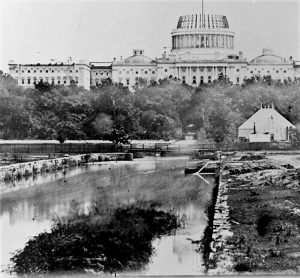
Old city canal
Previously in the novel: War Secretary Edwin Stanton holds President and Mrs. Lincoln captive under guard in basement of the White House. Janitor Gabby Zook by accident must stay in the basement too. Guard Adam Christy reports on his condition each evening to his sister Cordie and fellow hospital volunteer Jessie Home.
Cordie and Jessie both laughed as they stepped out the front door of the hospital onto the Mall and into the rancid smell of the old city canal, broken into little cesspools of urine, rotting animal carcasses, and scum-covered water. Discreetly, they both pulled out handkerchiefs to cover their noses. Cordie tried to maintain her composure as they walked past the neatly landscaped grounds of the Smithsonian. Soon her eyes were searching the shadowy corners of the large, red, castle-like building. The many bushes around its walls provided perfect hiding places after dark for the roving gangs of thieves which preyed upon passersby foolish enough to come near.
“Are you sure we’ll be safe?” Cordie whispered.
“Of course, me darlin’,” Jessie replied with a laugh. “If anyone dared to jump from the dark to grab me, they’d better be ready for a swift kick and jab of me elbow. Scottish lasses are strong, and loud. I’d scream like a banshee and more help than we could imagine would appear in the twinklin’ of an eye!”
“Are you sure?”
“As sure as I am of me red hair and Scottish brogue.” Jessie put her arm around Cordie and firmly squeezed. “Ye worry too much, me love.”
All the same, they increased their pace as they mounted the steps of the iron bridge over the stagnant canal, putting them out of harm’s way from the Smithsonian gangs. Cordie tried to compose her thoughts and control her heavy breathing.
“I’ve never been one of the smart ones,” she began slowly and humbly.
“Why, what a thing to say! You’re sharp as a tack, ye are!” Jessie gently slapped at her shoulder.
“No, I’m not really that bright when it gets beyond cleaning a floor or washing clothes or sewing.” Cordie shook her head. “Believe it or not, Gabby was the smart one. You wouldn’t know it now. When we were young, he was so bright and smart. I pinned my hopes on him. I always saw myself taking care of Gabby’s clothes and house, and he’d take care of me, always provide a roof over my head.” She paused to laugh ruefully. “I knew I wasn’t going to find a husband, the way I look.”
“What’s wrong with the way ye look?”
“Bless your sweet heart.” Cordie patted Jessie’s back. “You’re so pretty and attract men so easily, you don’t really understand how hard it is for plain women to find a husband.”
“I’m not that pretty.”
They stepped off the bridge and walked briskly up Thirteenth Street to escape the canal’s stench. Turning west on F Street, they slowed their pace as the air cleared, and they put away their handkerchiefs.
“Now Gabby was a handsome boy, smart and handsome,” Cordie continued. “Put him in a lieutenant’s uniform, and I knew he’s be irresistible to the young ladies. But I hoped he’d find one who wouldn’t mind having his old-maid sister live with them as their maid and nanny to their children.” She breathed deeply. “It was a good life I imagined. But it all ended when he went to West Point.” Cordie paused, halfway expecting a question from Jessie, and was relieved when it did not come. Turning north on Fifteenth Street, she mustered the strength to finish her story. “When he came home,” she said, “his mind was gone. I realized I would have to support him, to be the smart one.”
She stopped talking to keep from crying. Looking ahead at the corner, Cordie saw Adam standing under the streetlight in Lafayette Square, his shoulders slumped and his head down. She noticed a change in him over the last two months—not as dramatic as the change in Gabby, but a change nonetheless—that scared her. Cordie did not want to witness another young man wasted by the insatiable needs of the war machine.
“There’s me private,” Jessie said with a chirp, quickening her step to reach the park.
Cordie practically had to run to keep up with her, but she did not mind. Watching young love bloom brightened her life and relieved her of the constant worry about Gabby and why he must stay in the Executive Mansion.
Letters
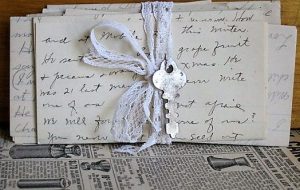
Black Swan Hotel
Denver, Colorado
July 8, 1895
123 Main St.
Enid, Oklahoma
My Dear Wife,
I miss you terribly and hope the company will soon recognize my talents and promote me to vice president in charge of sales so I may enjoy your company more often. With luck, I shall return to you by the middle of August. The weather in Colorado is pleasant enough but I would sacrifice my comfort to be under the torrid Oklahoma sun with you and the children. Tell the children I shall take them on a great camping adventure before school starts. How is Edward Junior recuperating from his bout of chicken pox? I must be off to my next appointment soon in a small town called Golden. It reminds me of your lovely locks.
With love,
Your Husband
Black Swan Hotel
Denver, Colorado
July 8, 1895
321 Main St.
Waxahachie, Texas
My Dear Wife,
I miss you terribly and hope the company will soon recognize my talents and promote me to vice president in charge of sales so I may enjoy your company more often. With luck, I shall return to you by the first of August. The weather in Colorado is pleasant enough but I would sacrifice my comfort to be under the torrid Texas sun with you and the children. Tell the children I shall take them on a great camping adventure before school starts. How is Edwina recuperating from her bout of measles? I must be off to my next appointment in a nearby town called Red Bud. It reminds me of your lovely locks.
With Love,
Your Husband
321 Main St.
Waxahachie, Texas
July 18, 1895
Black Swan Hotel
Denver, Colorado
My Dear Husband,
I am quite confused. We live in Texas, not Oklahoma and we have a daughter Edwina, not a son Edward Junior. I have red hair, not blonde. Edwina is terribly afraid of the outdoors and the little creatures that inhabit it so she would not enjoy a camping trip. She had chicken pox, not measles. I reread your letter several times thinking I must have misunderstood it. As you have pointed out to me several times I do have a tendency to misunderstand the simplest of statements. I will continue my sessions with Dr. Fitzmorgan in Dallas. I’m sure he will straighten this out for me.
With Love,
Your Wife
123 Main St.
Enid, Oklahoma
Aug. 4, 1895
Black Swan Hotel
Denver, Colorado
To My Soon-To-Be Former Husband,
Don’t bother to come home, you lying, cheating scoundrel. You should have realized you were not clever enough to have two wives at one time. To refresh your memory, I am the blonde-haired woman living in Oklahoma with our son Edward Junior, who by the way had measles not chicken pox. I exchanged several telegraphs with the lady residing in Waxahachie, Texas. She has canceled all her appointments with her doctor in Dallas and has engaged a lawyer. I have also hired a lawyer. Please expect a letter from the main office of your company stating you have been dismissed from your job because of a complete lack of morals. I must be off now to visit my mother and to apologize. She was right about you.
With absolutely no love,
Your Soon-To-Be Former Wife
Burly Chapter Four

Burlap or future teddy bears?
(Previously in the book: Herman anticipated fifth birthday on the plains of Texas during the Depression. He was overjoyed to receive a home-made bear, which magically came to life when Herman’s tear fell on him.)
Late one night, early in December when the first blue norther was just about ready to sweep down on the East Texas prairie from the Panhandle, Burly Bear nudged little Herman who was fast sleep.
“Huh?” Herman mumbled.
“Not so loud,” Burly whispered, holding his burlap paw to his lips. “I want to tell you something, but if Callie or Tad wake up I won’t be able to.”
“All right,” Herman said as he yawned and rubbed his eyes. “What is it?”
“Well,” Burly began slowly, looking down. “I’ve really enjoyed living with you and your family this year.”
Herman gave Burly a big hug. “And I love having you, too.”
“You love your mother and father very much, don’t you?” Burly asked softly.
Herman smiled broadly. “Oh yes. Mama is wonderful and papa isn’t half as scary as I thought. You helped me see that.”
“I can tell they love you too.” Burly paused for a long moment, then sighed deeply. “I want a family to love and to love me.”
“Why, Burly Bear,” Herman exclaimed. “I’m your family.”
“Shush,” Burly went.
Tad shuffled in his nearby bed. “Herman, shut up,” he mumbled, then rolled over and went back to sleep.
“I’m sorry,” Herman whispered.
“What I mean is, I want a family, a mama and a papa bear to love me and take care of me,” Burly finally blurted out.
Herman wrinkled his little forehead. “I don’t know how we can do that. Usually parents come first, then the children.”
“But stuffed bears don’t usually talk. So usually doesn’t count here.”
“I guess,” Herman said in a dreamy sort of way, staring out of the window. He turned back to Burly. “Christmas is coming soon. I could ask for two more bears.”
Burly shook his head. “That really wouldn’t be fair, would it? I mean, you already have me, and Callie and Tad don’t have any bears at all.”
Herman’s eyes twinkled. “Oh yes. Callie would love a mama bear very much. She’s always telling me how cute you are.”
“And Tad?”
Herman frowned again. “Oh, Tad. I don’t think he would like a stuffed toy. He’s almost grown.”
“Twelve years old is not as grown up as you think,” Burly said, adding wisely, “or as grown up as Tad thinks.”
“But Tad doesn’t like anything. I still don’t think he even likes me very much.”
Burly smiled. “I think he likes you more than you know. And he might like you better if he thought you liked him.”
“Oh, I like Tad,” Herman replied.
“But does he know that?” Burly asked. “What have you done to let him know?”
“I’m just six years old. What could I do to show Tad I like him?”
“You can do more than you think,” Burly replied. “Always remember that.”
“Okay.” Herman sighed. “What do I have to do?”
Burly whispered in Herman’s ear for several minutes, and then they both went to sleep, because they had busy days ahead of them before Christmas. After breakfast the next morning when the others left, Herman tugged on his mother’s apron as she washed the dishes.
“Mama, can I—can we give Callie and Tad something special for Christmas?”
His mother looked down at him with a sad look on her face. “I’m afraid none of us are going to get anything special this Christmas. You remember why, don’t you? I explained it all to you.”
Herman nodded seriously. “Yes. You called it the depressions.”
His mother laughed lightly and patted him on the head. “No, the Depression. Only one. Thank goodness.”
“But couldn’t you make Callie and Tad bears out of burlap, like you did Burly Bear?” Herman said quickly before all his courage went away.
“Why, yes, I suppose so.” She looked at Herman and looked proud of him. “I hadn’t thought of that. Yes, that would be a good idea. You’re smart, Herman. And sweet.”
She leaned over to kiss Herman on the cheek. One part of him wanted to pull away and pretend he didn’t like it. But another part liked it and wanted to hug his mother. That part won out, and Herman wrapped his arms around his mother’s waist. For a fleeting moment he noticed how terribly thin she was.
“If you want me to, I’ll go ask papa for the burlap,” Herman offered happily.
“You don’t mind doing that?”
“Oh no, papa and me, we’ve become big pals,” Herman bragged.
“Very well. He’s out in the barn, I think.”
Forever With Mama
Mama told me all the stories of the great blinding light and times of darkness and cold. She did not live through them herself, but she assured me it was not so long ago. Before the great glow, never-ending darkness and cold, there walked upon the earth terrible giants who kindly fed us and just as ruthlessly crushed us underfoot.
These stories were fading from my memory, and I was afraid. They gave me a reason for living and the determination to keep my legs moving in the eternal search for food. If I could only find Mama she would explain why food made life worth living. Or, rather, what worthwhile reason made eating so important.
The last time I remembered being with Mama we were in the midst of our kind. We clamored over each other trying to find food. At one point my legs gave way, and I felt a thousand little legs on my back. I sensed their fear and desperation. There were so many of us, and no one knew what to do but keep scampering around. If we kept moving maybe we would find a gooey mountain that once was one of the giants. The giants had become our food.
I knew that I was not smart. When I didn’t know what to do, I often did absolutely nothing and hoped absolutely nothing happened to me. This also gave me time to think about things Mama told me. We needed food to exist, but if we could not find food, we should look for water to drink. Drinking water would keep us alive until we found food.
If I found a pipe, she told me, crawl up it because pipes always carried water. I bumped into a long round thing which I thought was one of those pipes Mama talked about, and I climbed on it and began to scuttle upwards. One of my feet slipped into a crack so I decided to crawl inside. Mama said water was always inside the pipe.
It was dry. My legs weakened. I didn’t know how much longer I could walk. Within my body was a growing perception that I no longer cared to move. I tried to control the panic. Just ahead, I came upon a hole. Crawling through, I found myself in a great basin. My spirits lifted. This was one of the places where water existed.
In the distance I saw a great brown mound. It was one of us. As I came closer I knew who it was. I recognized the pattern of the shell. I smelled its essence. My antennae touched its antennae. It was Mama. I nudged her, hoping that she was just sleeping. But she was not sleeping. All that was left was her dry shell.
Momentarily I considered leaving to continue my search for food and water but changed my mind. My fatigue overwhelmed me. My legs could move no more. I was with Mama. And all was good.
David, Wallis and the Mercenary Chapter Fifteen

The man in his white linen suit
Previously in the novel: Leon, a novice mercenary, is foiled in kidnapping the Archbishop of Canterbury by a mysterious man in black. The man in black turns out to be David, better known as Edward the Prince of Wales. Soon to join the world of espionage is Wallis Spencer, an up-and-coming Baltimore socialite. David kills an ambassador in Shanghai.
Old Joe, the Eleuthera fisherman who had always given Leon a free ride back home, was dead. That was the word on the Freeport dock as Leon returned from the Far East. Yesterday morning someone dropped by his thatched roof bungalow and discovered him in his bed, clutching a couple of half crowns. Leon grimaced when he heard the news. Joe had been like a father to him in the last few years; however, when they last saw each other as Leon left for Shanghai, their friendship was strained. When Leon disembarked from the fishing boat at Freeport he handed Joe him two half-crown coins. Leon intended it as a gesture of appreciation. He could see in Joe’s eyes he had taken it as an insult, as though Leon was setting himself up to be the old man’s superior. Leon searched for the right words, but Joe gruffly pushed his boat away from the dock before Leon could explain. Now he would never be able to explain.
Perhaps it was just as well, Leon thought. When he went back through the Panama Canal after his mission, he took a quick tour of some of the shops in Panama City and bought himself a white linen suit, a wide brimmed hat and a new traveling bag. Leon conceded to himself that old Joe might have been right, because he did take considerable pleasure in hailing a boatman to take him back to Eleuthera. The man bowed deferentially as he loaded Leon’s new bag. The wind caught sail and impelled him homeward. Leon languidly leaned back, puffing on a cigarette of fine Egyptian tobacco.
When they landed, he placed a single half-crown in the man’s palm which made the boatman grin broadly and scurry to extend the plank to the dock and carry Leon’s bag ashore. At the last moment, Leon handed the man another coin to carry the bag down the dirt road to Leon’s house. He sauntered a few steps ahead of the carrier, lit another cigarette, tossing the match into a nearby sand dune. Soon he saw the high severe wall surrounding the Ribbentrop hacienda house. It still had the thick wood doors. Leon paused to take a long drag on his smoke, grabbed the bag from the boatman and dismissed him with a nod of the head. He removed a key from his pocket and unlocked the door.
The house was now his. The courtyard, once filled with exotic flowers, now overflowed with vegetables and fruit trees. He saw his mother Dorothy on her hands and knees between the rows pulling weeds.
“Mum!” Leon called out. “I told you to hire a village child to tend the garden.”
Looking up, she smiled. “I enjoy it. If I didn’t kneel down, soon I wouldn’t be able to.” She rose with great difficulty. “And then what good would I be?”
She walked to her son and kissed him. “My pretty little boy is home again safe at last.” Her wrinkled hand smoothed out the lapel of his linen suit. “I see you bought yourself a new fancy suit of clothes.” Her fingers ran down the sleeves. “Good for you.”
Behind him he heard a baby crying. He turned to see the pretty smiling face of his wife Jessamine. Though she was a mere slip of a woman, her slender arms ably held her child. Leon embraced both of them tenderly, showering their faces with little kisses. Though he did not even know the gender of the child, which had been born while he was half a world away trying to kill an old white Englishman, Leon already he loved this baby. He vowed he would be as good a father as his father had been to him. He would teach the same lessons of defeat, humility, defiance and brutality. As his father died to fill his belly with food, so would Leon die to feed his child.
“Say hello to your son Sidney,” Jessamine announced proudly.
“Is he strong?” Leon examined the tiny hands and feet. Sidney’s hand reached out to clutch Leon’s little finger. “Yes, very strong.”
“You are lucky you weren’t here. I screamed my head off, calling you all sorts of names.”
“How did the Freeport hospital treat you?” he asked.
”I didn’t go to the hospital. Pooka delivered him.”
“Pooka! That old witch! I gave you money to go to the hospital.” He stroked the baby’s cheek. “Only the best for my child.”
“Pooka is not a witch,” Jessamine corrected him. “She is the high priestess of Obeah.” She pulled a wad of bills from her dress pocket. “And I still have the money.”
Leon looked deeply into her eyes. “Obeah is one of many religions created by our people brought here from Africa in chains. We don’t need that. We can take care of ourselves now.”
One of Leon’s earliest memories of toddling down the beach was a plump, beautiful baby in the arms of a woman his mother called Auntie Millie. Millie, who was Dorothy’s best friend, kneeled down so little Leon could see little Jessamine better. Even then he knew he would spend the rest of his life with her. Jessamine grew into a slender woman who was not afraid of hard work. She always had a song on her lips even when times were tough. She was a passionate lover. But she was not as smart nor as skeptical as his mother. She let Pooka fill her with lies and fears. What of that, Leon told himself, because Jessamine was the sum of his reason to live. He took Sidney into his arms. No, he corrected himself, Jessamine and Sidney were his reasons to live.
“Besides,” Jessamine continued, “Pooka said things would not go well for you on your trip.”
Leon held Sidney up so the baby could see his white linen suit. “Does it look like it didn’t go well? I was paid handsomely. I won’t have to work again for a long time.”
“But it didn’t go the way you expected, did it?”
“No, it didn’t but I was paid more than I thought.” He rubbed noses with his son.
“See, Pooka was right.”
“I am home. I am holding my son. My wife is healthy. I have money. Even my mother is having fun playing in the dirt. Do we have to talk about Pooka?”
The next morning Leon awoke, dressed casually in shirt and shorts and took a long walk along the beach. By the time he returned home for breakfast, he noticed the plant pot outside his front gate was askew. Another assignment, he thought. So soon? He smiled as he took the message out. Good. More money the better.
“Tonight, Rialto.”
Rialto was the most popular casino in Nassau. Leon had to leave now to reach Nassau by evening. That night when he walked into the casino in his new linen suit, Leon looked around, certain someone would make a sign. One black jack table was empty. A tall blonde in a tailored tuxedo coat and silk blouse sat in the dealer’s chair. She stared at Leon.
He sat at her table. The woman immediately dealt him a hand. When he picked it up Leon noticed a note was tapped to the ace of diamonds. Discreetly detaching it he slipped it into his trousers’ pocket. Leon pushed the cards back at her.
“Fold.”
She scowled. “Finish the damn hand, jerk.”
“Only if you smile for me.”
Parting her red lips, she revealed even white teeth. Leon also noticed she was much younger than the way she was dressed and wore makeup. She could not have been more than fourteen or sixteen, he decided, the same age when he had to grow up too fast. Not only did he finish the hand he also played three more games, losing all three pots but at least she smiled at him.
Leon took the midnight ferry back to Eleuthera. Sitting in a deck chair he pulled the note from his pocket to read it.
“Lobby of Plaza. Labor day.”
Leon knew of only one Plaza Hotel, and it was in New York City. His stay at home was being cut short. Wadding up the note, Leon tossed it into the midnight waters of the Caribbean.
Petunias and Violets

(The petunia mentioned in this story was unavailable to pose for the picture so this other flower filled in.)
Petunias and violets in a flower bed,
Violets turn to petunias and said,
“Petunias, petunias, you’re crowding me here.”
“Violet, oh violet, so sorry my dear.
“My petals are big and need room to grow.”
“Petunia, oh Petunia, share the sun and let it show.”
“Violet, oh violet, this bed is not big enough.
“Either you must go or I will go nuts!”
Then someone walked up and went ooh and ah.
“The prettiest pot of flowers I’ve seen so far.
“Petunias and violets, pretty purple and pink.
“What a clever combination, whoever would think
“To plant them together in the very same way.
“Why seeing them side by side has made my day!”
Petunia looked at violet and turned an embarrassed red.
“It was mean of me to say you must leave this bed.
We must stay together; we must find a way!”
Violet thought just a moment to say,
“Let your petals lounge over the rim, giving them room
“To cascade down and show off your spectacular bloom.”
Petunia nodded happily and agreed, “And then
“That will leave the middle for you to grow, my friend!”
Petunias and violets thrive in their flower bed.
All it took was love and using their heads.
Lincoln in the Basement Chapter Thirty-Nine
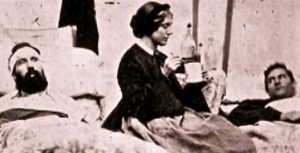
Tending the wounded
Previously in the novel: War Secretary Edwin Stanton holds President and Mrs. Lincoln captive under guard in basement of the White House. Duff and Alethia find pretending to be the Lincolns difficult. Alethia finds herself romantically attracted to Duff.
Another day found Cordie Zook putting away her mop and broom in a small closet of Armory Square Hospital. The sun had already set beyond the Potomac River, which caused her to worry about walking home. If only Miss Dorothea Dix honored her original agreement to allow volunteers to leave before dusk, all would be fine; but as more war casualties filled the long, parallel sheds of the hospital, the volunteers were forced to work later and later. More than ever, Cordie wished she had never left New York City, sure she could have found a job as a maid in a Park Avenue mansion, and Gabby could have been a janitor on Wall Street. Her lip began to quiver, but she commanded herself not to cry. It would do no good. It helped no one, not Gabby, not herself, not these poor broken boys lying in neat rows of cots in front of her.
Gathering her wits, Cordie went to the nurses’ cloak room, where she picked up her coat and hat and went down the line to get Jessie Home’s smart little tam-o’-shanter and plaid jacket. Jessie had become a good friend, Cordie admitted as she left the cloak room and started wandering up and down the aisles of cots, even though the young Scottish woman tried her patience from time to time. For instance, Jessie was never ready to leave when Cordie was desperate to go to Lafayette Park to hear about Gabby from the nervous private. She stopped short in the middle of an aisle and found herself forced to smile as she watched Jessie competently pull a fresh nightshirt over the head of an embarrassed, thin, shockingly pale soldier, who still self-consciously tried to hide the reddish nub that once had been his left arm.
“Now there’s no need for ye to be shamed in front of me,” Jessie said cheerfully as she grabbed the recovering nub and stuffed it into the white, coarse cotton sleeve. “You’re a national hero, and heroes should hold themselves proud.”
“But—but my arm,” the soldier stammered.
She smoothed the shirt down his chest and abdomen. “That’s your badge of manhood,” she replied smoothly. Smiling, she rubbed his white, gaunt cheek with her hand. “That shows you’re no longer a boy. What woman worth being a wife wants to be yoked with a pretty boy when she could have a real man?”
Cordie watched a smile creep across his lips, and she forgot about her fear of crossing the Mall after dark. This was thevolunteers’ purpose, to make the boys smile when other senses told them to cry. If they can do that, they can face the thieves and robbers who hid in the bushes surrounding the Smithsonian.
“It’s time to leave, Jessie,” Cordie said.
The young man looked up at Cordie, and then to Jessie. “You have to leave? You can’t stay a little longer?”
“I’d love to, me hero,” Jessie said, “but Miss Dix wouldn’t hear of it. If she found out I stayed late to sit by ye, she’d think I was tryin’ to romance ye, and then she’d fire me. Ye wouldn’t want me fired, now would ye?”
“I guess not.” His head fell a bit.
“Keep the faith, me hero.” Jessie took her coat from Cordie and put it on. “I’ll see ye again tomorrow.”
“Thank you.” His face brightened.
They walked away and put on their hats as several voices rang out.
“Good night, Miss Home.”
“Thank you, Miss Home.”
“God bless you, Miss Home.”
“I suppose the old lady who mops the floors don’t need a thank you,” Cordie said with a smile, trying not to sound jealous.
“They appreciate ye,” Jessie replied.
“Good night, Miss Zook,” an older voice called out.
“See?” Jessie grinned and grabbed Cordie’s arm. “It just takes maturity to recognize a true angel.”
“You don’t have to use your flowery words on me,” Cordie said, giggling. “Don’t forget. I’m a tough old Yankee.”
Burly Chapter Three
(Previously in the book: Herman anticipated fifth birthday on the plains of Texas during the Depression. He was overjoyed to receive a home-made bear, but his brother Tad’s ouburst ruined the moment.)
Herman climbed into the loft, took his clothes off and got into bed with Burly. He looked out of the window at the dark sky and thought how lonely he still felt. Burly was wonderful, and he could him hug him; but, Herman still felt lonely and sad. Part of it was because Tad made such a fuss and another was—well, Herman still didn’t know why. Again, as so many nights, tears began to fall from Herman’s eyes.
“Herman,” Burly said in a soft, soothing voice, “please don’t cry.”
Herman looked around. He didn’t know where the voice came from. Then he looked down to see Burly smiling up at him.
“Burly! You’re alive! You can talk!”
“Not so loud,” Burly shushed him. “Yes, I can talk, but only when it’s just you and me. When Callie and Tad, or anyone else is around I’m just a regular stuffed animal.”
“But why?”
Burly wrinkled his brow. “I don’t know. I don’t know why I can talk. But when your tear hit the top of my head I began to talk. That’s all I know.”
“Oh this is wonderful,” Herman whispered, hugging Burly tightly. “Oh! I didn’t hurt you by squeezing too right, did I?”
“Oh no,” Burly replied. “We burlap bears are pretty tough.”
“And you’ll be my friend!”
“Of course, I’ll be your friend,” Burly said. “I’ve been your friend ever since I was that feed bag. Remember, you rode in the pick-up to buy me at the feed store.”
“Not really,” Herman had to admit.
“You impressed me because you were so nice and kind and polite,” Burly explained. “And honest.”
“Thank you.”
“See how polite you are. Do you want to know a secret? I t was really my idea for me to be made into a bear. I made the bag rustle underneath your father’s hand that day so he would notice me and get the idea.”
“I didn’t think papa liked me enough to think of it on his own,” Herman sighed, a bit sad.
“Oh no, Herman,” Burly corrected him firmly. “Your father loves you very much. I could have sat there rustling all day long, but if he hadn’t really wanted you to have a bear, my rustling wouldn’t have meant much.”
“Oh.” Herman was happier knowing his father did love him after all.
“And do you know why he left so quickly after the birthday party?”
“He had to check the horses and cows,” Herman replied innocently.
“Wrong again,” Burly said. “He left because he didn’t want you to see him crying.”
“You mean papa cries? Gosh, I didn’t think anybody that big and strong ever cried.”
“Your father cries all the time, but you and your brother and sister don’t know it. He loves you all very much, and it makes him sad when he can’t give you things.”
“I guess things don’t matter as long as I know papa loves me.”
“Oh my, nice and kind and polite and smart too,” Burly sang. “I knew I was right to want to belong to you.”
Herman smiled a little, then thought of Tad and sighed. “I just wish Tad didn’t hate me.”
“Your brother doesn’t hate you,” Burly said. “He’s just jealous because he never got a stuffed bear. And he’s jealous because he has to go to school and help on the farm more than you do.”
“I do what I can,” Herman protested. “I’m only five.”
“Six. But you see, Tad is still just a little boy, even though he is bigger than you, so he doesn’t understand these things.”
“So maybe when he’s older he won’t hate me,” Herman said hopefully.
“Of course,” Burly assured him. “After all, he is your brother.”
Herman smiled and hugged Burly, knowing he would never feel sad or lonely again. “And you are my friend.”
“Yes, and you are my friend.”
Herman heard Callie and Tad come into the house, muttering and crying. He felt sorry they had gotten into trouble but felt good that they would know better as they got older. Like he would know better as he got older, with the help of Burly Bear, of course. He hugged Burly once more.
“Happy birthday, Burly.”
